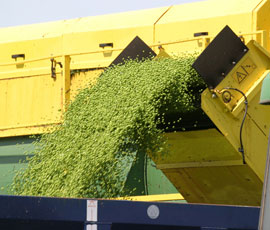Drought-tolerant pea varieties to be studied

New research could help breeders develop drought-tolerant pea varieties that can withstand drought conditions and climate change.
ABSTRESS, a five-year, €3m (£2.5m) European project, is being led by the Food and Environment Research Agency (FERA), which says it will “revolutionise the way in which plant varieties are produced”.
For the project, which has been announced as much of the UK is gripped by drought, the interaction of drought stress and fusarium infection in peas will be tested. Peas are being studied initially as they are well characterised genetically.
Under laboratory conditions, hundreds of these plants will be subjected to drought and/or infection with the soil fungus, fusarium.
Fusarium is being used as an example of disease stress because this type of infection affects the way in which plants can mobilise water and so the damage it causes is compounded during drought conditions.
Molecular and computational techniques will be used to identify how drought and disease combine. The project will also identify novel genes and biochemical pathways that improve plant resistance to these stresses.
The latest high throughput imaging technology will be used to monitor the performance of the plants without disturbing them. The information obtained from studying the model plant will then be applied to breeding new pea varieties.
These new varieties will be compared with existing commercial crops, identifying those which perform better when challenged with a combination of fusarium and drought. The best of the plants will undergo field trials at different sites across Europe.
Adrian Charlton, project leader and FERA’s head of chemical and biochemical profiling, said: “This project should lead to ground-breaking improvements in the techniques used for crop breeding.
“FERA scientists will be studying the biochemical profiles from the best performing plants and linking these back to the genes responsible using advanced computational techniques.”
Peas, like other legumes, have a key role as a sustainable source of protein in both human and animal diets, he added.
“Importantly, peas can replace imported soya beans, which currently represent over 75% of feedstock protein in the EU.”
Researchers aim to develop principles and techniques that can be rolled out for crop breeding generally. This should significantly reduce the time taken to breed new crop varieties that are more able to withstand the challenges commonly associated with climate change, such as extreme weather and the changing incidence of pests and diseases.
FERA, an executive agency of DEFRA, said increased cultivation of drought and disease-resistant legumes developed as a result of this project will be important in ensuring future food security, whilst mitigating the effects of climate change.
Project partners in the UK include the University of Essex, Colchester and the University of Aberystwyth, Wales.

